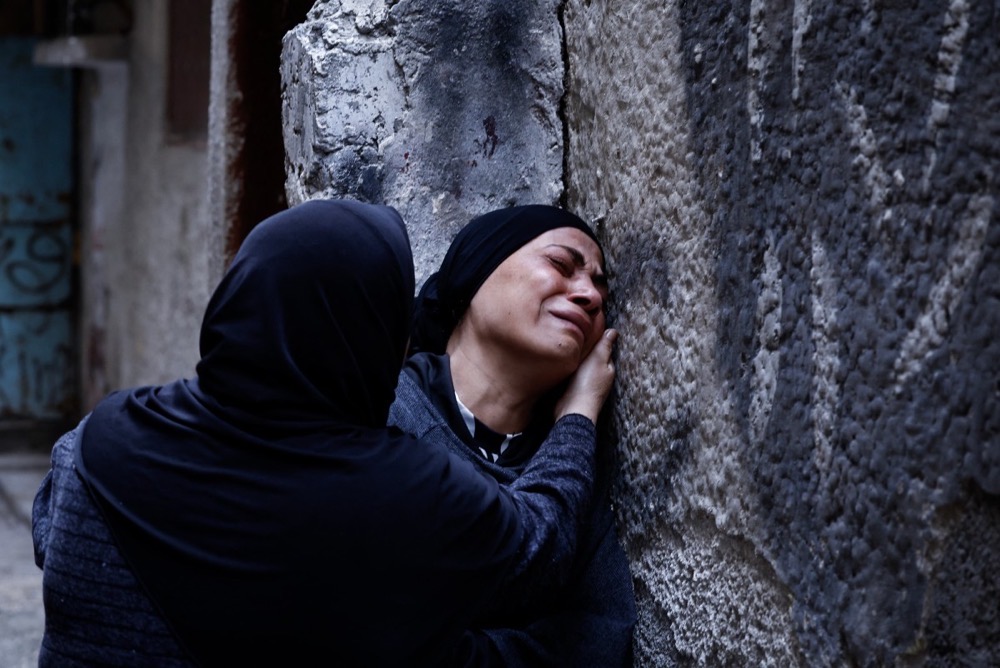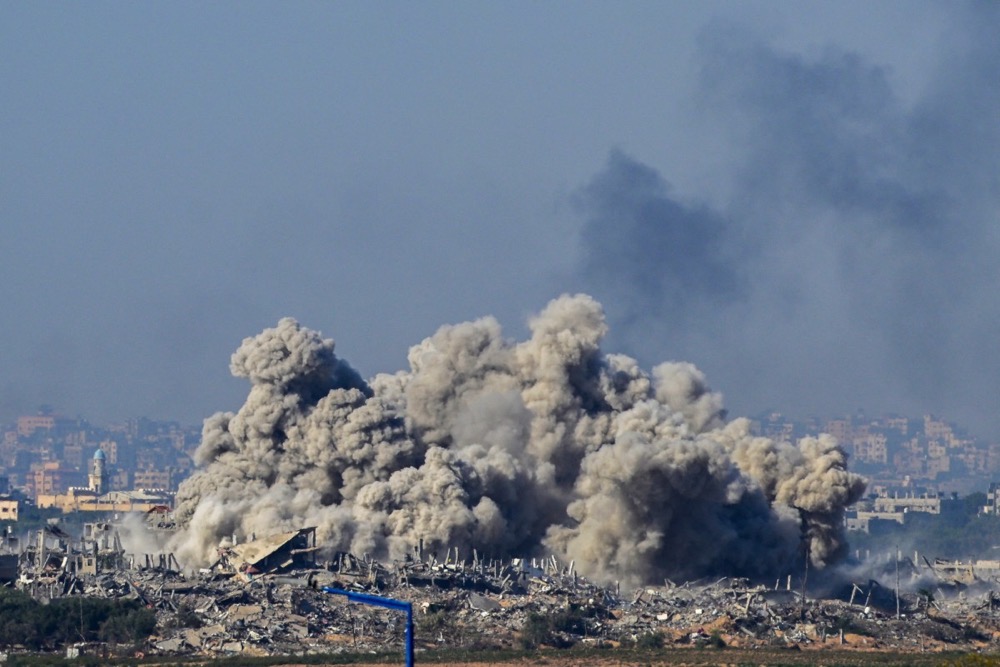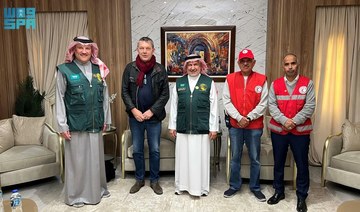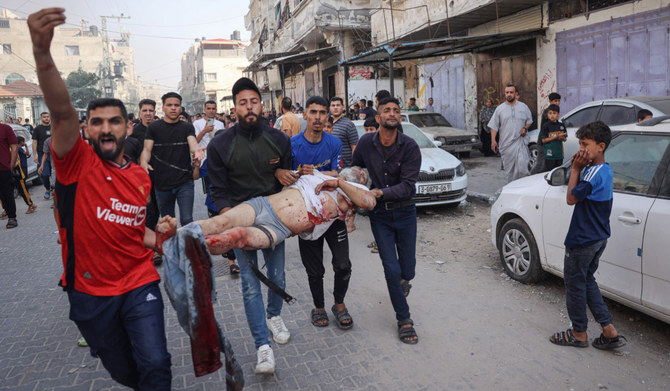DUBAI: Saudi Arabia has intensified its humanitarian support for the people of Gaza with 15 relief flights touching down in Egypt in recent days carrying hundreds of tons of food and shelter materials for delivery into the embattled enclave.
Earlier this week, upon the directive of King Salman and Crown Prince Mohammed bin Salman, the King Salman Humanitarian Aid and Relief Center, or KSrelief, launched the Kingdom’s first aid convoy to Gaza, comprising 30 trucks loaded with supplies.
The assistance arrived after weeks of intense Israeli bombardment of the Gaza Strip and tight restrictions on the flow of aid and essential utilities like fuel, electricity and water, which has left hospitals overwhelmed and the population in desperate need.
A humanitarian truce agreement, due to come into effect on Friday, will provide aid agencies with a window of opportunity to deliver urgent assistance to civilians inside Gaza and to allow for the safe exchange of hostages and prisoners.

As of Nov. 15, donations made via the Kingdom’s Sahem charity platform to the Saudi National Campaign for Gaza had exceeded SR494 million. (SPA)
KSrelief has started delivering aid by sea and air, Dr. Samer Al-Jetaily, the Saudi charity’s director of resources and investment, told Arab News. “The first one carried around 500 tons until now.
“Fifteen airplanes have arrived in Arish (the capital and largest city of the North Sinai Governorate of Egypt). We are cooperating well with the Egyptian Red Crescent, which allows us to take aid directly through the Rafah (crossing) to try to make it reach Gaza.”
Further Saudi aid shipments are arriving by sea at Port Said in northeast Egypt and have also been taken to the Rafah crossing, where trucks provided by international aid agencies have been stacked up for weeks awaiting Israeli clearance to enter Gaza.
Al-Jetaily said he had visited the Rafah border crossing three times over the past two weeks where he met with several displaced Gazans who had managed to flee the carnage to safety in Egypt.
“It is expected that we will have more aid planes arriving in Arish,” he said. “We also have three ships going to Port Said on Saturday and Tuesday. We will continue providing aid. Hopefully, there will be a truce. We are ready to move more aid to Gaza.”
KSrelief had about 326 trucks waiting at Rafah to enter Gaza. Further Saudi aid, including a fleet of 20 ambulances, is expected to arrive at Port Said in the coming days.

Hamas, the Palestinian militant group that has controlled Gaza since 2007, launched an unprecedented attack on southern Israel on Oct. 7, killing about 1,200 people and taking some 240 Israelis and foreigners back to Gaza as hostages. (AFP)
On Sunday, the first vessel, carrying some 1,050 tons of aid, departed Saudi Arabia’s Jeddah bound for Egypt, while a second departed earlier this week.
This surge of Saudi aid is arriving ahead of an anticipated four-day humanitarian pause in the fighting that is scheduled to begin on Friday to coincide with the release of 50 Israeli hostages held by Hamas in exchange for 150 Palestinians held in Israeli jails.
Hamas, the Palestinian militant group that has controlled Gaza since 2007, launched an unprecedented attack on southern Israel on Oct. 7, killing about 1,200 people and taking some 240 Israelis and foreigners back to Gaza as hostages.
Israel responded to the attack with a massive bombardment and ground operation designed to eliminate Hamas and liberate the hostages. In the process, more than half of Gaza’s civilian population has been displaced, hospitals, schools, and other infrastructure knocked out of action, and more than 14,000 people killed, according to the Hamas-run Health Ministry.
“The situation on the ground is so catastrophic and a complete disaster,” said Al-Jetaily.

On Sunday, the first vessel, carrying some 1,050 tons of aid, departed Saudi Arabia’s Jeddah bound for Egypt, while a second departed earlier this week. (SPA)
“(However), the Israelis only allow 30 trucks right now to enter (at a time). When they do enter it will take three days’ round trip for the trucks to go from Rafah to Karama and other areas of Gaza.
“This is hindering the entire process. We cannot deal with humanitarian aid right now in a professional or minimal way. We hope the truce agreement will give us a chance.”
Saudi Arabia began its Gaza relief campaign on Nov. 2, when King Salman made an $8 million donation, while his son, Crown Prince Mohammed bin Salman, donated $5.3 million.
As of Nov. 15, donations made via the Kingdom’s Sahem charity platform to the Saudi National Campaign for Gaza had exceeded SR494 million ($132 million) from 773,310 donors — a figure that is steadily rising.
SAUDI AID IN NUMBERS
• 30 Aid trucks loaded with food, medicines and shelter supplies.
• 14 Ambulances equipped with medical devices, respirators and oxygen.
• 15 Planes enlisted by Saudi Arabia for air deliveries.
• 20 Additional ambulances to be delivered by air and sea.
Dr. Abdullah Al-Rabeeah, the supervisor-general of KSrelief, visited Rafah on Wednesday to oversee the deployment of aid into Gaza, alongside Osama Nugali, the Saudi ambassador to Egypt, and representatives from the Egyptian and Palestine Red Crescent.
The KSrelief team also checked warehouses, examined the operation of Saudi aid trucks delivering supplies, and oversaw cooperation with the authorities responsible for delivering aid to the besieged enclave.
“We are kicking off this campaign as a gift and a small contribution to our brothers in Gaza,” Al-Rabeeah told Arab News. “The convoy includes 30 aid trucks loaded with food, medicines and shelter supplies, in addition to 14 ambulances fully equipped with aid devices, respirators and oxygen, and everything needed by our brothers in Palestine.”

An Israeli strike on the Palestinian territory on November 21, 2023, amid ongoing battles between Israel and Hamas. (AFP)
Egyptian authorities have been working around the clock to facilitate the buildup of aid on Gaza’s only border crossing to the outside world.
“I would like to thank the Egyptian government for its fruitful efforts to facilitate the tasks of KSrelief,” Nugali said in a statement during his visit to Rafah.
“We are not facing any challenges to deliver the aid, except the restrictions by the Israeli side, which has led to only 50 trucks entering Gaza in one day despite hundreds of aid trucks awaiting permission.
“We hope that the cease-fire which started today will result in the entry of more aid awaited by our brothers in Gaza.”
On Thursday, Al-Rabeeah signed a cooperation agreement with the Egyptian Red Crescent, the International Red Cross, the UN Relief and Works Agency, the World Health Organization and the World Food Programme worth $40 million.
He also held talks in Egypt with Philippe Lazzarini, UNRWA’s commissioner-general, to discuss the delivery of aid to the Gaza Strip. Al-Rabeeah said KSrelief aims to save the lives of Palestinians in Gaza, where women, children and the elderly are in urgent need of food, water, shelter and medicine.

A humanitarian truce agreement, due to come into effect on Friday, will provide aid agencies with a window of opportunity to deliver urgent assistance. (SPA)
“We feel that supporting these organizations operating inside Gaza will help a lot to improve the situation,” Al-Jetaily told Arab News.
One of the provisions of the truce agreement is to allow 200 trucks to enter the Gaza Strip.
Before the conflict, about 400 trucks were permitted to enter Gaza via the Rafah crossing each day, carrying everything from humanitarian assistance to commercial goods.
“Now with the lack of food, lack of medicine, lack of water, everything and fuel, almost 800 to 1,000 trucks are needed every day to save lives to help the humanitarian situation,” Al-Jetaily added.
“They (the Israelis) are doing everything to impose restrictions on humanitarian aid with direct restrictions. They are using the lack of fuel and medicine as a war weapon against civilians in Gaza. They are restricting all kinds of aid to enter Gaza.”



























